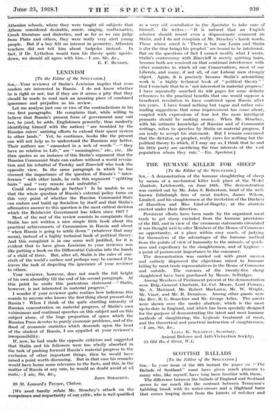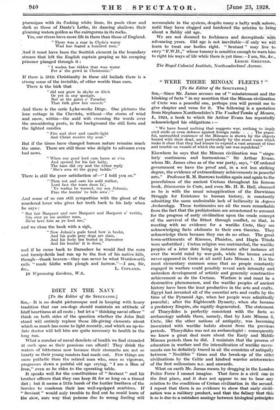SCOTTISH BALLADS [To the Editor of the SPECTATOR.] SIR, —In your
issue of the 9th instant the paper on " The Ballads of Scotland" must have given much pleasure to many who, like myself, have long been familiar with them. '
The difference between the ballads of England andScotland seems to me much like the contrast between Tennyson's' babbling brook, with. its water-dresses and a Highland burn that comes leaping' down- from the -haunts of red-deer and
ptarmigan with its flashing white linns, its pools clear and dark as those of Dante's Lethe, its dancing shallows their gleaming waters golden as the cairngorms in its rocks.
Yes, our rivers have more life in them than those of England.
" There was a roar in Clyde's water Wad hae feared a hundred men."
And it must have been the Scottish element in the boundary stream that left the English captain gasping as his escaping prisoner plunked through it :
" I wadna hae ridden that wan water For a' the gowd in Christentie."
If there is little Christianity in these old ballads there is a. strong sense of the invisible, of other worlds than ours. There is the birk that
" did not grow in skyke or ditch Or yet in ony quengle, But at the gates o' Paradise That birk grew fair eneuch." ,
And there is the eerie Lyke-werke Dirge. One pictures the lone cottage in the Cheviots, without—the storm of wind and snow, within—the auld wife crooning the words over the smouldering peats, in the background the still form and the lighted candles
" Fire and sleet and candle-light And Christ receive thy soul."
But if the times have changed human nature remains much the same. There are still those who delight to advance even bad news.
" When our good lord cam hame at e'en And speired for his fair laidy, The tane did cry and the tither reply
She's awa wi the gypsy- laddie.' " There is still the poor satisfaction of—" I told you so."
" Then oot and cam his auld mither, Lord fast the tears doon fa', Ye wadna be warned, my son Johnnie, Free- the huntin' to bide awa'.' "
And some of us can still sympathize with the ghost of the murdered lover who gives her troth back to his lady when he says :
" But fair Margaret and rare Margaret and Margaret o' veritie, Gin ever ye roe anther man, Ne'er love him as ye load me,"
and we close the book with a sigh,
" Now Jelmie's gude bencl bow is broke, And his gude grey dogs are slain, And his body lies buried in Daresdeer And his huntin' it is done,"
and if he came back to Daresdeer he would find the corn and turnip-fields had run up to the foot of his native hills, though—thank heaven—they can never be what Wordsworth calls " made blithe with plough and harrow."—I am, Sir,































 Previous page
Previous page